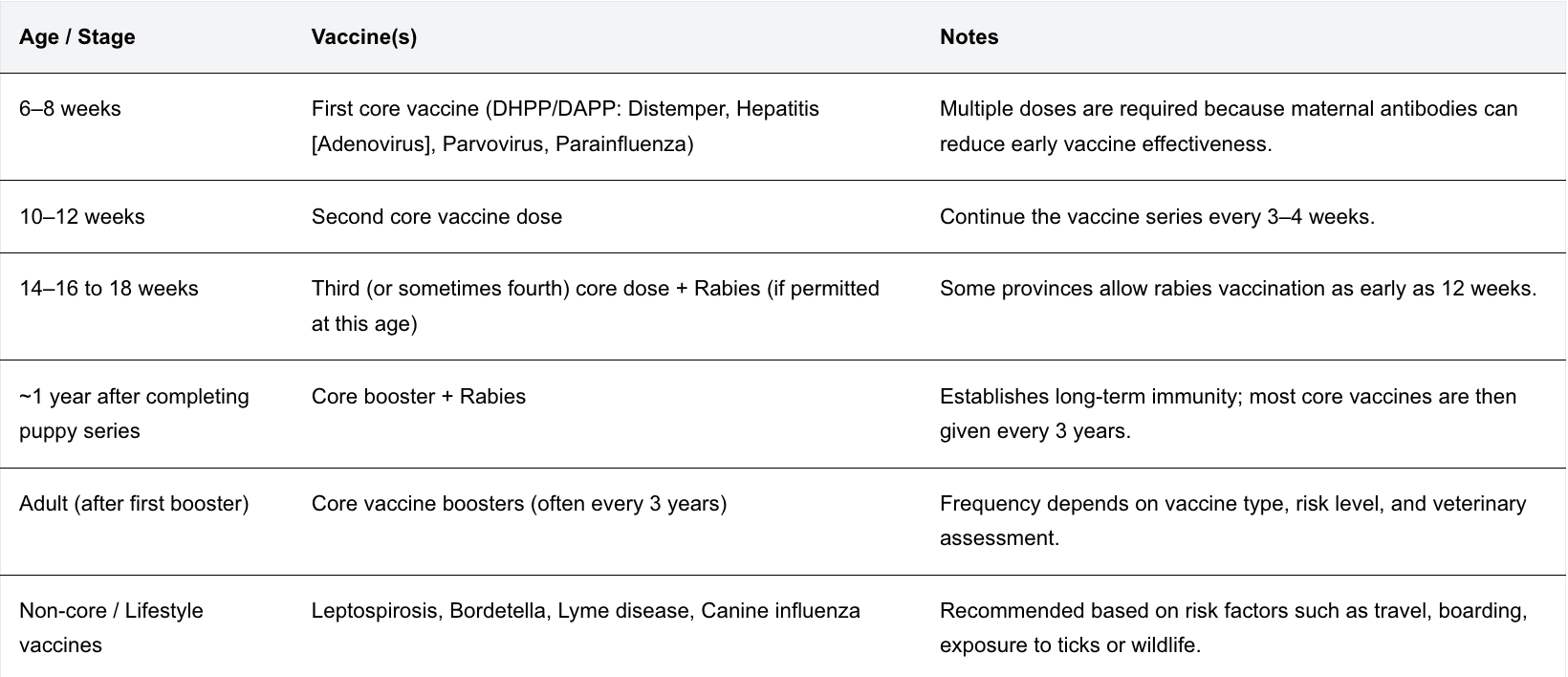Puppy Care Guide
Week 12 – Vaccination & Early Training

“A Healthy Start Builds a Lifetime of Wellness”
Your puppy is now 12 weeks old — playful, curious, and bursting with energy! This stage marks the beginning of an important milestone in their health journey: vaccinations.
Just like human babies, young dogs need a series of vaccinations to help their immune systems learn how to fight off diseases safely.
💉 Understanding Puppy Vaccinations in Canada
In Canada, veterinarians follow the vaccination schedule recommended by the Canadian Veterinary Medical Association (CVMA). Most puppies receive their first shots between 6 to 8 weeks of age and continue every 2–4 weeks until about 16 weeks old. This ensures full protection once the antibodies from their mother’s milk begin to fade.
Common core vaccines include:
- DHPP: Distemper, Hepatitis, Parvovirus, Parainfluenza
- Rabies: Legally required in most provinces and municipalities
- Bordetella (Kennel Cough): Often required for puppy classes or boarding facilities
Annual boosters are usually recommended to maintain long-term immunity.
🩺 PetGo Tip
Puppies don’t retain lifelong immunity like humans do. Regular booster shots keep them healthy and protected year after year.
Puppy Vaccination Schedule
It’s time to start protecting your puppies. Visit your veterinarian to begin the vaccination series according to this schedule:

⚠️ Before and After Vaccination
Before the appointment
- Schedule your visit in the morning when your puppy is rested.
- Avoid intense play or baths 2–3 days before the vaccine.
- If your puppy seems unwell, it’s best to reschedule the appointment.
After the appointment
- Your puppy may feel tired or sore — let them rest quietly.
- Avoid walks, playdates, or baths for at least 24 hours.
- Mild sleepiness or soft stool is normal.
- If your puppy vomits, has diarrhea, or seems unusually weak, contact your veterinarian immediately.
🩷 PetGo Reminder
Observe your puppy closely for a day or two after each vaccination. Comfort them with calm affection — rest is part of recovery!
Early Training & Socialization
At this age, puppies begin learning about the world — sights, sounds, people, and other pets. This is the perfect time to introduce gentle socialization.
- Keep experiences positive and short.
- Teach simple cues like “sit” or “come” using small treats and praise.
- Avoid harsh correction — keep it fun and consistent.
🐕 Tip: Hold a treat just above your puppy’s nose at a slight angle — they’ll naturally sit. Reward that calm posture right away!
🐾 Find Dog Training Programs
Want to take your puppy’s training to the next level? PetGo’s Dog Training section will feature step-by-step lessons, expert guidance, and personalized behavior insights to help your puppy grow with confidence.
Explore Dog Training >🩺 Deworming & Parasite Prevention
Most Canadian veterinarians recommend starting deworming at 4–6 weeks of age, with repeat treatments every few weeks until 16 weeks old, followed by monthly preventatives.
Parasite prevention (like heartworm or flea control) may begin around this stage, depending on your vet’s advice and your local climate.
The 12-Week Takeaway
- Schedule your second or third round of vaccinations
- Begin light, positive training and social exposure
- Maintain consistent routines and rest time
- Continue parasite prevention and vet check-ins
“Healthy habits start young — your care now builds the foundation for your puppy’s lifelong wellbeing.”
Continue with PetGo’s Puppy Care Guide
Vaccines, training, and consistent love — PetGo is here to help you build a strong foundation for a happy, healthy puppy life.
© 2025 PetGo. All Rights Reserved
